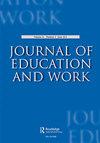流动性与稳定性:工薪阶层学生的研究生就业经历
IF 1.7
Q2 EDUCATION & EDUCATIONAL RESEARCH
引用次数: 0
摘要
从大学到大学毕业生的劳动力市场竞争日益激烈。由于大学学位不再是成功的保证,毕业生开始调动其他形式的资本来获得竞争优势。第一家庭成员和工薪阶层的学生被视为处于不利地位,因为他们无法获得雇主喜欢的经济、社会和个人资本。这篇文章是基于一个定性的纵向研究的第一家庭,工人阶级的学生在加拿大。2005年刚上大学时,我的志向和目标都很高,想要获得更大的流动性。我将展示大多数人在16年的研究中是如何逐步修改这些目标的,以及他们是如何采取一系列策略来克服工人阶级的潜在劣势,从而获得职业成功的。他们进一步唤起了一种超越职业成就的更广泛的流动性概念,因为他们还讨论了通过教育实现的个人/智力增长,他们在不放弃工人阶级根源的情况下发展和积累中产阶级文化资本的能力,以及稳定比地位的重要性。本文章由计算机程序翻译,如有差异,请以英文原文为准。
Mobility and stability: post-graduate employment experiences of working-class students
ABSTRACT The transition from university to the graduate labour market has become increasingly competitive. As university degrees no longer offer a guarantee for success, graduates mobilise other forms of capital to gain a competitive advantage. First-in-family and working-class students are seen to be disadvantaged as they lack access to the types of economic, social and personal capital employers prefer. This article is based on a qualitative longitudinal study of first-in-family, working-class students in Canada. Starting university in 2005 with very high ambitions and goals for substantial mobility, I will show how most gradually revised these goals over the 16 years they have been followed in the study, and how they engaged in a range of strategies to negotiate their potential working-class disadvantages to find career success. They further evoked a broader notion of mobility beyond career achievement, in that they also discussed personal/intellectual growth through education, their ability to develop and accumulate middle-class cultural capital, while not abandoning their working-class roots, and the importance of stability over status.
求助全文
通过发布文献求助,成功后即可免费获取论文全文。
去求助
来源期刊

Journal of Education and Work
EDUCATION & EDUCATIONAL RESEARCH-
CiteScore
2.70
自引率
14.30%
发文量
40
期刊介绍:
The Journal of Education and Work is an international forum for academic research and policy analysis which focuses on the interplay of the education and economic systems. The journal examines how knowledge, skills, values and attitudes both about and for work and employment are developed within the education system. The journal also explores the various forms of industrial training and accreditation in the economic system, including changes in the economic and industrial infrastructure which influence the type of employees required. Work in the informal economy is also included.
 求助内容:
求助内容: 应助结果提醒方式:
应助结果提醒方式:


